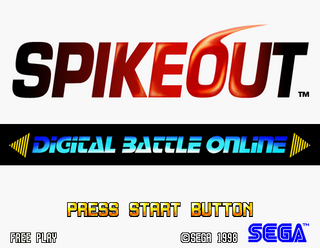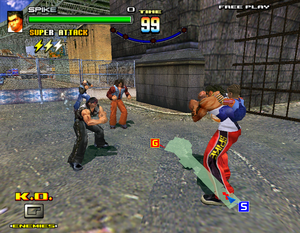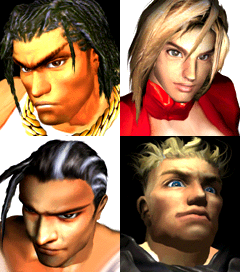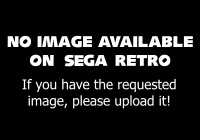Spikeout: Digital Battle Online
From Sega Retro
| Spikeout: Digital Battle Online | |||||||||||||||||
|---|---|---|---|---|---|---|---|---|---|---|---|---|---|---|---|---|---|
| System(s): Sega Model 3 Step 2.1[1] | |||||||||||||||||
| Publisher: Sega | |||||||||||||||||
| Developer: Sega AM11[2] | |||||||||||||||||
| Supporting companies: Digital Design Studio | |||||||||||||||||
| Distributor: Deith Leisure (UK)[3] | |||||||||||||||||
| Genre: Action | |||||||||||||||||
| Number of players: 1-4 | |||||||||||||||||
|
This short article is in need of work. You can help Sega Retro by adding to it.
Spikeout: Digital Battle Online (スパイクアウト デジタルバトルオンライン) is a Sega Model 3 Step 2.1 arcade beat-'em-up game, and the first game in the Spikeout series. It has never been ported to home consoles. Spikeout is notable for being the first arcade beat-'em-up whose cabinets could be linked, resulting in a maximum of four players competing on the same level with different screens.
During development the game was known as Spike. It was followed by an update, Spikeout: Final Edition, in 1999.
Contents
Gameplay
Spikeout is a fully-3D beat 'em up which takes place in huge and sprawling stages – split into sections called Areas, further divided into little segments. Progressing through these "segments" are quite simple; beat up every enemy that appears within one of them. Once enough enemies have been defeated, the player then has to quickly "Break the Gate": Locate a flashing barrier/barricade of some sort (i.e. a door) – in the later Final Edition, with the additional help of a red directional arrow (ala Crazy Taxi) – to punch through to progress to the next segment/Area, within 30 seconds (in which doing so quickly enough will give you bonus points). Due to the semi-open nature of the levels, and the inclusion of multiple Gates in certain stages, it very much acts as a "choose-your-path" system.
Each Area usually ends in a face-off with the "Bosses" – signified by the brief, flashing "Here Comes the Boss" overlay – whom, for the most part, act as mini-bosses. You may face up to three of these bosses at the same time; along with the current enemies in the Area. (Note that once one or many boss(es) appear, you will only need to defeat them in order to clear a segment, and not any remaining enemies.) After successfully clearing an Area, the score results will appear, giving you extra bonus points (and health) for the amount of enemies you've defeated in the Area, and how fast you cleared the last 30-second "Break the Gate" in the Area.
Downed enemies can sometimes drop items such as "Life Up" health kits (which replenish your health) and "Special Attack" items which allow you to perform a "Special Attack"; the latter being represented as floating thunderbolt symbols. Many commonplace objects found within each stage can be picked-up and used as weapons – from baseball bats and swords, to chairs and car tires, to name a few. There's a constant time limit which can be replenished by downing a certain number enemies at a time within each stage – once the timer reaches zero, you get an instant game over. The KO counter on the bottom-left corner shows how many enemies you've defeated within each Area. START changes the view of the mini-map on the bottom-right corner.
In addition, Spikeout is also a co-operative multiplayer game; up to four players can join a game, and can do so at anytime. One distinction against other 3D beat 'em up games is that any player in a co-op session can go anywhere within the boundaries of an Area's segment, thereby making it possible for players to stick close to one another and fight together, or to split up and take care of a multitude of foes elsewhere. Friendly fire can also be performed among players if so chosen, and there are also a variety of taunts and commands one can use as means of limited communication with other players.
Playable characters
| Spike | |
|---|---|
| A former New York boxer. Height, 185cm/6'0.8"; Age, 27. He is not good with interpersonal relationship, typically being silent and expressionless if he's not in a fight. His intimidating presence makes people fear him, except for White who works in the same factory as him. Spike always carries his 5-year-old son on his back[7].
His boxing history makes Spike good at punching, particularly straight punches, while his kicks and big and flashy. He overwhelms opponents with pure strength. His greatest strength is his charge move, which takes extra long to charge but deals by far the most damage. His weakness is that his attacks easily miss when not facing an enemy head on. | |
| White | |
| A military man born in New York. Height, 185cm/6'0.8"; Age, 25. He has an optimistic and mischievous personality, always talking in a loud voice. The first person to beat him in a fight was Spike, and White has been keeping tabs on Spike ever since[7].
He uses a punch-centric style like Spike, but with more uppercuts and even bigger kick motions. His attacks come out quick, but have the shortest reach of any character, so he needs to quickly close the gap between himself and enemies. Both White and Spike have good combos against enemies they've knocked in the air. | |
| Linda | |
| The intelligent daughter of a successful family, she had plans to become a judge in the future. While she is generally calm, she has a strong moral compass and will take action if she believes someone to be in the wrong. She serves as the mediator between White and Tenshin[8].
Her fighting style mainly makes use of kicks, with all sorts of kicking techniques at her disposal. Unlike every other character, B is kick and C is punch. She uses kicks as combo starters which transition into close-quarters finishers. Her fast movements and long reach makes her easy for beginners to use, though still has some advanced combos. | |
| Tenshin | |
| A 23-year-old Japanese man, he towers over the other 3 characters at 193cm/6'4". He is a well-read, intelligent person who always speaks calmly. Because he chooses his words carefully to not be wasteful, he is the antithesis to White. Tenshin rarely gets angry, but can be the scariest if provoked[8].
His fighting stye is a wild martials arts style consisting of various spinning techniques, back fists and roundhouse kicks. There is an elegant rhythm to his combos that let him overwhelm groups of opponents. His attacks cover a wide berth, but there are brief pauses in-between attacks, making him a bit tricky for beginners to use. Tenshin is suppodely modeled after chief stage designer Daisuke Sato.[9] |
Stages
| Diesel Town | |
|---|---|
| Diesel Town is an urban setting where most of the areas are industry-related.
| |
| Astro Mall | |
| Astro Mall is a shopping mall. The stage has much fewer terrain-related obstacles and more advanced enemy patterns.
| |
| Imperial Opera | |
| Imperial Opera is the mansion home of big bad Mikhael.
|
History
Development
Spikeout was envisioned by director Toshihiro Nagoshi, while he was still a part of AM2 and sometime after the release of Virtua Fighter 3tb, during which point that arcade games in Japan were slowly beginning to stagnate.
| “ | [Spikeout] was my personal rebellion. [laughs] I wanted to develop a game where you could play for a long time on just one coin. It was great for the players, but profits suffered because you have to take the arcade operators into consideration. At that time there was a drought of arcade games and I virtually wanted our new game to “Spike-Out” and reinvigorate the market. The fact that it was a character based action game emphasized that. | „ |
Development began on April 1997[11], with the development team consisting of AM2 team members that worked on Virtua Fighter 3 and Scud Race, with a few from the Fighting Vipers team as well[11]. Special difficulty was reserved for the implementation of the multiplayer network; although the team was already familiar with networking due to their experience with most of AM2's numerous driving games, as Spikeout was a game that featured more "character data" than cars, they endured numerous trials and errors getting it to function properly.
Officially revealed under the working title of "Spike" during a private Japan-only Sega arcade show on May 19th 1998[12], under the AM2 banner, the announced title had two peculiarly ambitious features that were dropped in the final product:
- The game was originally meant to be a 16-player multiplayer game, with the players split into four separate teams in-game – as opposed to the finalized 4-player-only game. Presumably, the number of allowed players was cut down to four due to both the enormous and difficult task of creating sixteen separate, playable characters, as well as performance issues having so many players (and enemies) on-screen.
- Spikeout was meant to have linked machines "self-play" in the absence of other human players – AI-controlled allies would've automatically joined the battle to assist the single human player.[13]
Just before it's release, the game was shown again in playable form at the Amusement Machine Show 1998, still under the AM2 banner.[14][15]
Legacy
A Dreamcast port of the game was being developed, but never saw the light of day outside of a few copies[16]; with Nagoshi himself stating that the main reason the port was never completed was due to the Dreamcast having insufficient hardware capabilities at the time for such a port[17]. (It would take a full seven years before a consumer-based Spikeout title would be released on a console.)
The engine for Spikeout was later utilized in the Dreamcast game Rent-A-Hero No. 1.[18][19] Sega Logistics Service announced it would end service on Spikeout arcade machines on March 31, 2017.[20][21]
Production credits
- Main article: Spikeout: Digital Battle Online/Production credits.
Magazine articles
- Main article: Spikeout: Digital Battle Online/Magazine articles.
Physical scans
| Sega Retro Average | |||||||||
|---|---|---|---|---|---|---|---|---|---|
|
| 100 | |
|---|---|
| Based on 1 review | |
| Model 3 Step 2.1, World | ||||
|---|---|---|---|---|
External links
- Sega of Japan's Japanese Spikeout page (archived)
- Sega of Japan's English Singapore Spikeout page (archived)
- Amusement Vision's Spikeout Digital Battle Online and Final Edition page (archived)
References
- ↑ 1.0 1.1 https://github.com/mamedev/mame/blob/master/src/mame/drivers/model3.cpp
- ↑ 2.0 2.1 Sega Arcade History, Enterbrain, page 150
- ↑ Computer & Video Games, "August 1998" (UK; 1998-07-15), page 76
- ↑ 4.0 4.1 Edge, "January 1999" (UK; 1998-12-23), page 130
- ↑ http://www.famitsu.com/cominy/?m=pc&a=page_h_title&title_id=24455
- ↑ 6.0 6.1 Computer & Video Games, "September 1998" (UK; 1998-08-12), page 77
- ↑ 7.0 7.1 Dreamcast Magazine, "1998-02 (1998-11-27)" (JP; 1998-11-13), page 166
- ↑ 8.0 8.1 Dreamcast Magazine, "1998-02 (1998-11-27)" (JP; 1998-11-13), page 167
- ↑ Dreamcast Magazine, "1998-06 (1998-12-25)" (JP; 1998-12-11), page 166
- ↑ 2003 interview with n1ntendo.nl
- ↑ 11.0 11.1 Next Generation, "November 1998" (US; 1998-10-20), page 21
- ↑ Gamers' Republic, "August 1998" (US; 1998-07-21), page 8
- ↑ File:CVG_UK_200.pdf, page 11
- ↑ Edge, "August 1998" (UK; 1998-07-17), page 35
- ↑ Edge, "November 1998" (UK; 1998-10-05), page 9
- ↑ http://archive.videogamesdaily.com/news/200401/021.asp
- ↑ http://archive.videogamesdaily.com/features/sega_av_interview_july04.asp
- ↑ File:DCM_JP 19991001 1999-30.pdf, page 52
- ↑ File:DCM JP 20000609 2000-20.pdf, page 58
- ↑ File:SegaProductsTerminationAnnouncement 2016-11 JP.pdf
- ↑ File:SegaProductsTerminationAnnouncement 2016-12.pdf
- ↑ Arcade, "December 1998" (UK; 1998-11-17), page 150
| Spikeout: Digital Battle Online | |
|---|---|
|
Main page | Credits | Magazine articles
| |
| Games in the Spikeout series | |
|---|---|
| Spikeout: Digital Battle Online (1998) | Spikeout: Final Edition (1999) | Slashout (2000) | Spikers Battle (2001) | |
| Spikeout: Battle Street (2005) | |
| Spikeout related media | |
| Spikeout Original Soundtrack (1998) | Fantasyscape Slashout: Original Soundtrack (2000) | Spikeout: Battle Street Original Sound Track (2005) | |




